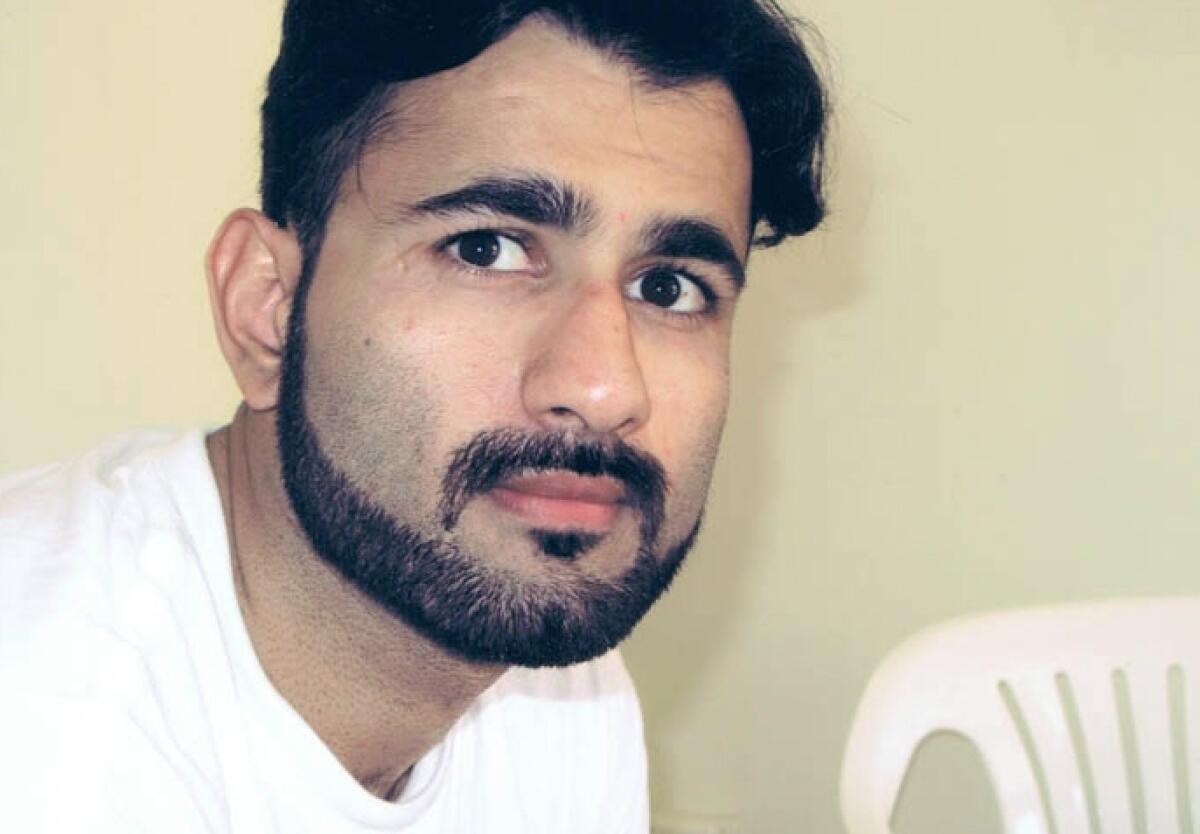Ex-Maryland man who joined Al Qaeda sentenced at Guantanamo

- Share via
FORT MEADE, Md. — A military jury imposed a sentence of 26 years Friday on a former Maryland man who admitted joining Al Qaeda and has been held at the Guantanamo Bay detention center. But under a plea deal, the man could be released as soon as next year because of his cooperation with U.S. authorities.
The sentencing of Majid Khan is the culmination of the first trial by military commission for one of the 14 so-called high-value detainees who were sent to the U.S. naval base in Cuba in 2006 after being held in a clandestine network of overseas CIA detention facilities and subjected to the harsh interrogation program developed in response to the attacks of Sept. 11, 2001.
Khan, a 41-year-old citizen of Pakistan who came to the U.S. in the 1990s and graduated from high school near Baltimore, earlier pleaded guilty to war crimes charges that included conspiracy and murder for his involvement in Al Qaeda plots such as the deadly bombing of the J.W. Marriott hotel in Jakarta, Indonesia, in August 2003.
He apologized for his actions, which included planning Al Qaeda attacks in the U.S. after 9/11 and a failed plot to kill former Pakistan President Pervez Musharraf. During a two-hour statement to jurors on Thursday, he said: “I did it all, no excuse. And I am very sorry to everyone I have hurt.”
Gov. Michelle Lujan Grisham stopped short of calling for a ban on real guns on film and TV sets. She’s planning to question Hollywood leaders on safety reforms.
The jury of eight military officers was required to reach a sentence of 25 to 40 years. Jurors heard of Khan’s extensive cooperation with U.S. authorities following his guilty plea and heard a two-hour statement from the prisoner describing his brutal CIA interrogation and captivity in the three years before he came to Guantanamo.
In addition to the sentence, the jury foreman said seven of the eight jurors had drafted a letter to Pentagon legal authorities recommending clemency to the defendant, which is an option under the military commission legal system.
A pretrial agreement means he could be released as early as February, at which point he would be resettled in an as-yet to be determined third country. He cannot return to Pakistan.
Jurors were not told about the pretrial agreement, which requires a Pentagon legal official known as a convening authority to cut his sentence to no more than 11 years because of his cooperation. He would also be given credit for some of the time he has already spent in custody.
Despite that agreement, the prosecution urged the jury to recommend a sentence at the higher end of the range as the defense urged jurors to consider Khan’s cooperation, contrition and the brutal conditions of his captivity.
“Since the commission of these crimes, Majid is a different person,” said Army Maj. Michael Lyness, a defense attorney. “Majid Khan is reformed and deserving of your mercy.”
Army Col. Walter Foster, the lead prosecutor, sought to cast doubt on Khan’s story of being led astray by radical Islam as a young man. He conceded the prisoner had also experienced “extremely rough treatment” at the hands of the CIA, but pivoted to remind the court of the 11 people killed in the Marriott bombing.
“He is still alive and with us today, a luxury that the dead and victims of the J.W. Marriott bombing do not have,” Foster said.
Khan’s cooperation is expected to help with other war crimes cases at Guantanamo, one involving five men held there who are charged with planning and aiding the Sept. 11 attacks. Such cases have been bogged down for years in the pretrial stage at the base and become one of the obstacles to closing the detention enter.
More to Read
Sign up for Essential California
The most important California stories and recommendations in your inbox every morning.
You may occasionally receive promotional content from the Los Angeles Times.











